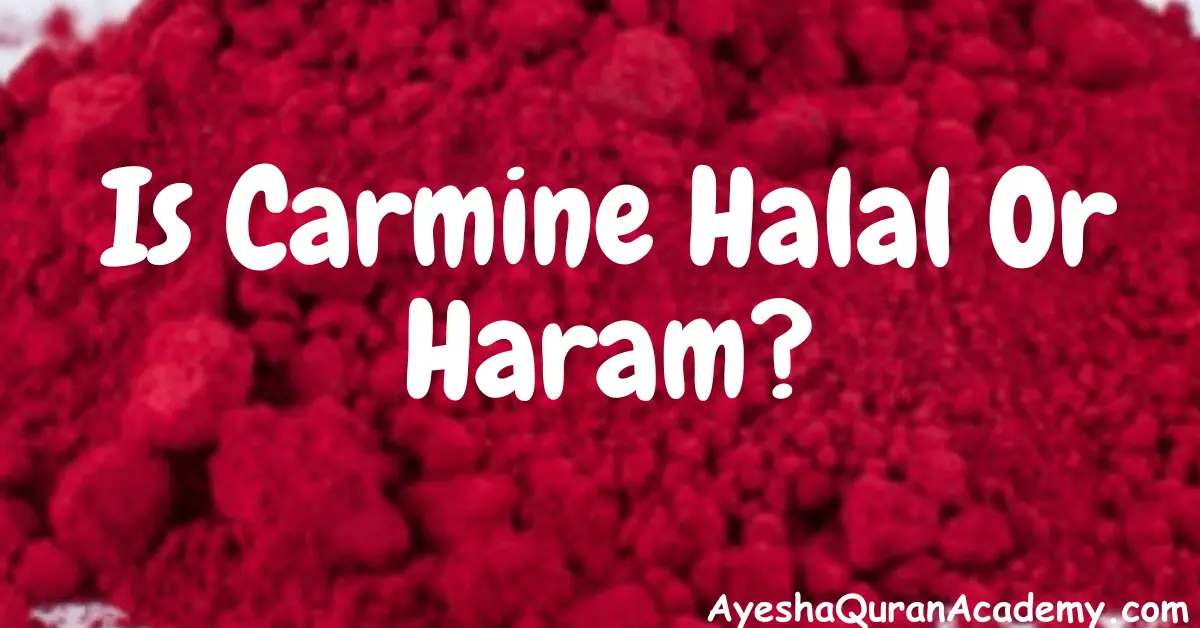When it comes to dietary choices, particularly for individuals following halal guidelines, it’s essential to have a clear understanding of the ingredients used in various products. One such ingredient that has sparked controversy and confusion is carmine.
In this comprehensive guide, we will delve deep into the topic of carmine, addressing the burning question: Is carmine halal? We will explore its origins, and applications, and provide you with insights into whether it aligns with halal dietary principles.
Understanding Carmine
The Basics of Carmine
Carmine, which is also referred to as cochineal extract or natural red 4, is a bright red food coloring that is obtained by crushing the bodies of female cochineal insects. Harvesters mainly find these insects in South and Central America and collect them for their rich pigments.
The Uses of Carmine
Carmine finds use in a wide range of food and cosmetic products as a versatile ingredient. Some common applications include:
- Food coloring in candies, yogurts, and beverages.
- Natural dye in cosmetics, including lipsticks and blush.
- Coloring agent for pharmaceuticals.
Historical Significance
Carmine has a rich history dating back to ancient civilizations. The Aztecs and Incas were among the first to utilize cochineal insects to create red dyes.
During the colonial period, cochineal became a highly coveted export, often referred to as “red gold,” due to its economic significance.
Is Carmine Halal
Many Muslims have asked whether carmine is Halal. So simply, carmine is not haram till if any haram product is used in it.
The use of carmine in cosmetics such as lipsticks and eye shadows has been a major concern.
Carmine, also known as carminic acid, originates from insects such as Cochineal and Porphyrophora.
Manufacturers use it to create the vibrant red hues in cosmetics. Additionally, Carmine serves as an ingredient in food products including yogurts, juices, syrups, sauces, and confectionery.
The Halal Perspective
Determining whether carmine is halal can be complex. The halal status of carmine has been a subject of debate within the Muslim community.
Islamic dietary laws declare certain foods and ingredients as permissible (halal) while deeming others as prohibited (haram).
Controversy Surrounding Carmine
The controversy arises from the source of carmine – insects. Some scholars argue that the consumption of insects is prohibited in Islam, which makes carmine haram.
However, others contend that carmine undergoes a significant transformation during processing, rendering it halal.
Seeking Clarity
To ensure that Carmine aligns with halal principles, it is crucial to consult with knowledgeable Islamic scholars and organizations that specialize in halal certification.
These experts can provide guidance based on comprehensive research and Islamic jurisprudence.
Applications of Carmine
Food Industry
1. Coloring Agent: Carmine is widely used in the food industry as a natural food coloring. Its vibrant red hue makes it a popular choice for products such as fruit juices, yogurts, candies, and confectionery.
2. Beverages: Many beverages, including fruit-flavored sodas and sports drinks, contain carmine to achieve their visually appealing red color.
3. Bakery and Desserts: In the realm of baked goods and desserts, carmine adds color to items such as cake icing, frostings, and gelatins.
Non-Food Items
1. Cosmetics: Carmine is a common ingredient in cosmetics, particularly in lipsticks, blushes, and eyeshadows. It imparts a vibrant and long-lasting red color to these products.
2. Textiles: The textile industry also utilizes carmine for dyeing fabrics and textiles, producing various shades of red and pink.
3. Pharmaceuticals: In some pharmaceutical formulations, carmine is used as a coloring agent for oral medications and capsules.

Islamic Perspective
Permissible (Halal), The majority of Islamic scholars consider carmine to be permissible (halal) for consumption and usage in non-food items. This ruling is based on the premise that the source of carmine, the cochineal insect, is not among the prohibited animals or substances in Islam.
Alternatives to Carmine
For individuals who prefer to avoid carmine or seek halal alternatives, several options are available:
- Beetroot extract: A natural red dye obtained from beets.
- Pomegranate juice concentrate: Provides a vibrant red color and a hint of fruity flavor.
- Synthetic food colorants: Man-made red colorants approved for use in halal products.
Carmine In USA
In the USA, carmine is a widely used natural red food coloring. Ingredient labels list it, and it appears in various food and beverage products, including candies, fruit juices, and processed foods. The U.S. generally recognizes it as safe (GRAS). Food and Drug Administration (FDA) when used within specified limits.
Carmine In UK
In the UK, carmine serves as a food coloring, similar to its application in the USA. It appears in a range of food and beverage products, such as confectionery, desserts, and beverages.
The European Food Safety Authority (EFSA) and the UK Food Standards Agency (FSA) regulate the utilization of carmine, assuring compliance with safety and labeling standards for consumers in the United Kingdom.
Conclusion
In the quest to determine whether carmine is halal, it’s crucial to consult with knowledgeable religious authorities and organizations specializing in halal certification.
While the controversy surrounding carmine’s halal status persists, alternatives such as beetroot extract and pomegranate juice concentrate offer viable options for those seeking halal-compliant ingredients.
Remember to scrutinize product labels for transparency and always prioritize your dietary preferences and religious beliefs.
In conclusion, whether you choose to embrace Carmine or explore alternatives, your dietary choices should align with your values and beliefs, ultimately promoting a lifestyle that resonates with your individual convictions.
FAQs
Yes, carmine commonly finds use as a food and cosmetic colorant, and it can be present in various everyday products.
Indeed, natural alternatives like beetroot extract and pomegranate juice concentrate are considered halal instead of carmine.
The use of carmine in pharmaceuticals is a matter of debate among scholars. It is advisable to consult with a qualified Islamic authority for specific guidance.
Carminic acid typically holds a halal status within Islamic dietary laws when it originates from permissible sources and adheres to Islamic guidelines during its use.


